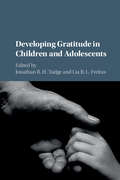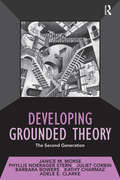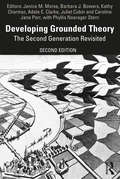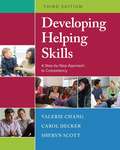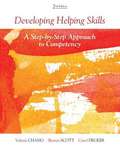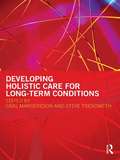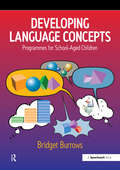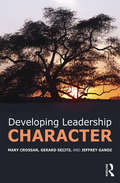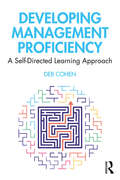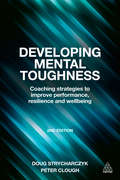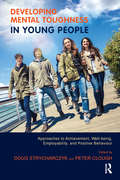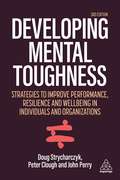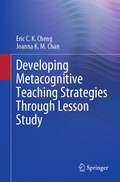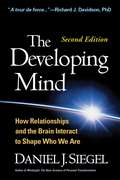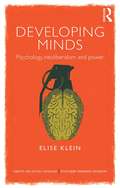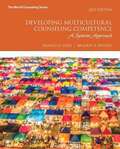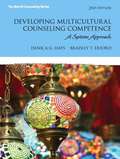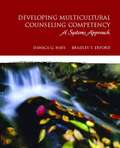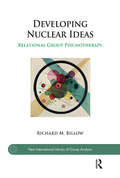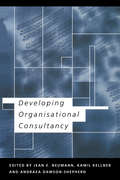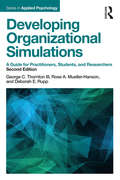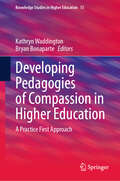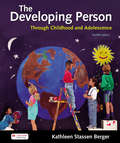- Table View
- List View
Developing Gratitude in Children and Adolescents
by Tudge Jonathan R. H. De Lucca Freitas Lia BeatrizIn popular opinion, gratitude means saying 'thank you'. While politeness and appreciation are certainly important, gratitude is a larger issue. Appropriately defined, it encompasses the strengthening of human relationships and qualifies as a moral virtue. This important and timely volume provides the conceptual framework for studying the development of gratitude, with a comprehensive and international set of authors approaching the topic from philosophical, psychological, and educational perspectives. The first section provides the theoretical underpinnings for the study of gratitude as a virtue. In the next section, the authors examine the ways in which gratitude develops, including key cross-cultural variations and some possible effects of its development. The final section then considers the links between parent and child gratitude and the ways in which parents and teachers can help to encourage gratitude, both in their everyday practices and by using literary texts.
Developing Grounded Theory: The Second Generation (Developing Qualitative Inquiry #3)
by Juliet Corbin Barbara Bowers Kathy Charmaz Adele E. Clarke Janice M. Morse Phyllis Noerager SternGrounded theory is the most popular genre of qualitative research used in the health professions and is widely used elsewhere in the research world. In this volume, six key grounded theory methodologists examine the history, principles, and practices of this method, highlighting areas in which different strands of the methods diverge. Chapters cover the work of Anselm Strauss, Barney Glaser, Leonard Schatzman, and the postmodern and constructivist schools. Dialogues between the participants sharpen the debate and show key topics of agreement and disagreement. This volume will be ideal for courses on grounded theory that wish to show the ways in which it can be used in research studies.
Developing Grounded Theory: The Second Generation Revisited (Developing Qualitative Inquiry)
by Juliet Corbin Kathy Charmaz Adele E. Clarke Janice M. Morse Phyllis Noerager Stern Caroline Jane Porr Barbara J. BowersDeveloping Grounded Theory: The Second Generation Revisited is a highly accessible description of the rapid development of grounded theories and the latest developments in grounded theory methods.A succinct overview of the development of grounded theory is provided, including the similarities and differences between Glaserian and Straussian grounded theory. The method introduced by Schatzman, and the development of Charmaz’s constructivist grounded theory and Clarke’s situational analysis, are clearly presented. The book is divided into seven sections: each type of grounded theory is discussed by the developer (or their student), followed by a chapter describing a project that used that particular type of grounded theory. Bookending these chapters is the first chapter, which describes the development and landscape of grounded theory, and a final chapter describing the challenges to the future of grounded theory. This book is ideally suited for beginning students trying to come to grips with the field as well as more advanced researchers attempting to delineate the major types of grounded theory.
Developing Healthy Relationships: A Guide for Singles
by Jeff ParzialeWhat is holding you back from a healthy deeply fulfilling relationship?
Developing Helping Skills: A Step-by-step Approach To Competency
by Valerie Chang Carol Decker Sheryn ScottChang, Scott, and Decker's multilayered teaching and learning system presents a creative blend of learning methods and clear presentation of topics to help students think like practitioners and apply foundational skills to real-world practice. Students first read about professional practice and the skills required to work effectively with clients. Students then think and write about the ideas and concepts presented in the text by completing homework exercises following each new concept. Next, students watch and discuss the accompanying DVD (available for packaging with the text), which demonstrates how to use the skills covered in the text with an individual, family, or group. Furthermore, the text's modified case-based method introduces a continuing case, one section at a time, throughout the chapters, which helps students learn how to think like professionals. Finally, exercises with specific directions for role-playing the client, practitioner, and peer supervisor, followed by a simple evaluation tool completed by the peer supervisor and practitioner, promote practice and evaluation.
Developing Helping Skills: A Step-by-step Approach To Competency
by Valerie Nash Chang Sheryn T. Scott Carol L. DeckerWhether you are preparing for social work, psychology, counseling, marriage and family therapy, pastoral counseling, human services, or a related helping profession, this unique book offers the fundamental knowledge and skills sets you need. The authors' multilayered learning system integrates reading, discussion, observation and visualization, practice, and evaluation. Self-assessment, critical thinking, and practice play a central role in the book's presentation as the text prepares professionals in training for generalist practice with individuals, families, and groups, including entire communities and organizations. You begin by reading the text and completing the homework exercises that follow each new concept. You then view the accompanying DVD (available for purchase) to see how to apply the skills in practice effectively. The text's case-based approach helps you think like a professional with a continuing case that is introduced one section at a time. Finally, role playing in practice interviews and completing evaluation tools allow you to assess progress and determine your personal readiness to apply your skills within actual life settings.
Developing Holistic Care for Long-term Conditions
by Steve Trenoweth Carl MargeresonDeveloping Holistic Care for Long-term Conditions focuses on how to help people with long-term health conditions cope more effectively. It brings together physical and mental health, offering a holistic approach for students and practitioners in a variety of care settings. Comprising four sections, this text introduces the policy and background to caring for people with chronic illness as well as the psychosocial impact of long-term conditions. Essential skills for practice are explored including holistic assessment, symptom control and the promotion of effective partnership between client and carer in supporting coping, recovery and end of life care. There is an emphasis on maximising individual health potential and resilience with the role of nutrition, exercise, complementary therapy and spirituality considered. The focus is on client centred care which addresses the whole person, mind and body. The extensive final section presents examples of key health issues where UK national guidelines have been published including: Long-term neurological conditions Diabetes Mental health Cancer Coronary heart disease Older people This evidence-based book takes note of the relevant National Service Frameworks and offers an informative and pragmatic guide for all those learning about caring for the chronically ill, as well as providing a useful reference work for qualified nurses and allied health professionals.
Developing Interactional Competence in a Japanese Study Abroad Context
by Naoko TaguchiIn the process of second language acquisition, the ability to interact effectively is critical. But what does it mean to be interactively competent? This book addresses this question by presenting research on the development of interactional competence among learners of Japanese as a second language. Qualitative data collected on learners studying abroad in Japan is evaluated to explain changes in their interactional competence and provides specific insights into the learning of Japanese. The situated analysis of multiple data sets generates meaningful interpretations of the development of interactional competence in the development of interactional competence and the learner-specific factors that shape developmental trajectories. Moreover, the context of the research provides insights into the types of learning resources and experiences that study abroad provides to assist learners' in their progress towards becoming a competent speaker in the target community.
Developing Language Concepts: Programmes for School-Aged Children
by Bridget BurrowsThis book is a valuable resource for all speech language therapists, teachers and support assistants working with children in schools and community clinics. It provides practical, step-by-step photocopiable programmes to help with specific language concepts, such as amount, colour, size, time and shape. The programmes are intended for speech language therapists to copy and send to the school where staff can deliver the programmes, although they can be used by the therapist themselves. Clearly set out, the exercises can be personalised for each child and are graded so that the therapist can select and copy the sheets relevant to the child's needs. Each programme introduces the concept, teaches it and then checks to see if the child understands it. There is also practical advice on setting up therapy programmes in schools, such as setting up appointments, working in the school with children, staff and parents, covering letters to send with the programme, how to write programmes and many other useful tips.
Developing Leadership Character
by Gerard Seijts Mary Crossan Jeffrey GandzThis book focuses on the element of leadership that has largely been neglected in the literature: character. Often thought to be a subjective construct, the book demonstrates the concrete behaviors associated with different character dimensions in order to illustrate how these behaviors can be developed, and character strengthened. Based on research involving over 300 senior leaders from different industries, sectors and countries, Crossan, Seijts, and Gandz developed a model for leadership character that focuses on eleven dimensions. The book begins by setting the context for the focus on character in business, asking what character is and whether it can be learned, developed, molded or changed. Next, the book focuses on each dimension of leadership character in turn, exploring its elements and the ways in which it can be applied in a business setting. The book concludes with a summary of the key insights, an exploration of the interactions between the character dimensions, and a call to the reader to reflect on how to develop one’s own and others’ leadership character. Bridging theory and management practice, Developing Leadership Character will interest students and practitioners alike. Readers will benefit not only from a new, robust theoretical framework for leadership character, but will also learn how character can be developed further.
Developing Managerial Proficiency: A Self-Directed Learning Approach
by Deb CohenDeveloping Management Proficiency: A Self-Directed Learning Approach is a pragmatic, easy-to-follow roadmap for managers to help develop the behaviors and skills necessary for success. Strong behavioral competencies are essential for any manager today. Emphasizing a self-directed learning approach, this book is designed to transform passive learners into active learners by helping to develop behavioral skills, based on individual needs. By providing the reader with the tools for self-directed learning, Deb Cohen provides an unending mechanism to learn, improve, and grow, helping develop the proficiencies needed to be successful in doing their job or advancing in their career. With features such as practical examples, worksheets, tables, and figures, the book is packed full of self-directed learning activities including role play, observation, networking, journaling, and questioning, all powerful drivers of learning and development. With expert guidance on how to approach personal development in day-to-day activities rather than in a formal course setting, this book is an essential resource for managers at all levels, as well as anyone training or interested in a managerial role.
Developing Mental Toughness
by Peter Clough Doug StrycharczykMental toughness is about how effectively individuals respond to stress, pressure and challenge. It is rooted in the notion of resilience but moves beyond this by being highly applicable and measurable. Understanding this concept is essential to improving performance for both the individual and organization, and this ground-breaking book explains mental toughness clearly and effectively. Tracing its development from sports psychology into the world of business, health and education, Developing Mental Toughness was the first book to look at applications at the organizational level and to provide a reliable psychometric measure. The new edition includes greater coverage of how mental toughness relates to other behaviours and can be applied to leadership, creativity, emotional intelligence, and motivation. It also looks at its applications in employability and entrepreneurship, and there will be expanded coverage of coaching for mental toughness. Written for anyone coaching individuals and teams for improved performance, the book contains practical guidance and techniques, exercises, case studies and the Mental Toughness self-assessment tool.
Developing Mental Toughness in Young People: Approaches to Achievement, Well-being, Employability, and Positive Behaviour
by Peter Clough Doug StrycharczykThis book provides more clarity into what mental toughness means and to measure its impact when children and young people are taught how to acquire it not as a "chalk and talk" didactic exercise but experientially.
Developing Mental Toughness: Strategies to Improve Performance, Resilience and Wellbeing in Individuals and Organizations
by John Perry Peter Clough Doug StrycharczykHow can individuals and organizations understand and measure mental toughness to deal with stress and challenge, and so improve performance? This fully updated third edition of Developing Mental Toughness provides the answers to unlock this potential.Tracing its development from sports psychology into the business sector, Developing Mental Toughness provides a reliable psychometric measure to apply at the organizational level. With coverage on how mental toughness relates to other behaviours and can be applied to employability, leadership, performance, creativity, emotional intelligence and motivation, the practical guidance and exercises in this book make it essential reading for academics, managers and coaches alike.This third edition includes an expansion of the 4Cs model to include concepts on learning orientation and resilience and new chapters on evidence-based practice and using the Mental Toughness Questionnaire (MTQ48) to gain richer self-awareness. Featuring case studies from Deloitte and Ethiad, Developing Mental Toughness is the practical coaching guide for developing capabilities and resilience.
Developing Metacognitive Teaching Strategies Through Lesson Study
by Eric C. Cheng Joanna K. ChanThe book illustrates how Lesson Study can be applied to craft metacognitive teaching strategies to enhance students’ learning to learn competencies. Based on the findings of an empirical study of a university-funded teaching development project, this book reports how to apply Lesson Study and Learning Study to enhance teachers’ metacognitive teaching competencies with a view to tackling the impacts and challenges created by and underlying the learning to learn curriculum. The book allows readers to experience metacognitive learning by sorting the prior knowledge on the metacognition, setting the goal and planning reading schedule, checking their understanding and progress, evaluating what they have or have not learned and reflected on their reading experience and feelings. Readers can grasp the key concept underpinning metacognitive teaching, including teaching strategies for developing students’ metacognitive abilities that include working on problem-solving activities, working on small collaborative groups, making metacognitive and learning strategies explicit, and encouraging students to reflect upon and talk about their learning.
Developing Mind, Second Edition
by Daniel J. SiegelThis bestselling book put the field of interpersonal neurobiology on the map for many tens of thousands of readers. Daniel J. Siegel goes beyond the nature and nurture divisions that traditionally have constrained much of our thinking about development, exploring the role of interpersonal relationships in forging key connections in the brain. He presents a groundbreaking new way of thinking about the emergence of the human mind and the process by which each of us becomes a feeling, thinking, remembering individual. Illuminating how and why neurobiology matters, this book is essential reading for clinicians, educators, researchers, and students interested in promoting healthy development and resilience. New to This Edition Incorporates significant scientific and technical advances. Expanded discussions of cutting-edge topics, including neuroplasticity, epigenetics, mindfulness, and the neural correlates of consciousness. Epilogue on domains of integration--specific pathways to well-being and therapeutic change. Useful pedagogical features pull-outs, diagrams, and a glossary.
Developing Minds: Psychology, neoliberalism and power (Concepts for Critical Psychology)
by Elise KleinDevelopment policy makers and practitioners are becoming increasingly sophisticated in their ability to target ‘development’ interventions and the psychological domain is now a specific frontier of their interventional focus. This landmark study considers the problematic relationship between development and psychology, tracing the deployment of psychological knowledge in the production/reproduction of power relations within the context of neoliberal development policy and intervention. It examines knowledge production and implementation by actors of development policy such as the World Bank and the neo-colonial state - and ends by examining the proposition of a critical psychology for more emancipatory forms of development. The role of psychology in development studies remains a relatively unexplored area, with limited scholarship available. This important book aims to fill that gap by using critical psychology perspectives to explore the focus of the psychological domain of agency in development interventions. It will be essential reading for students, researchers, and policy makers from fields including critical psychology, social psychology, development studies and anthropology.
Developing Multicultural Counseling Competence: A Systems Approach (3rd Edition)
by Danica G. Hays Bradley T. ErfordDesigned to help students and new counselors acquire multicultural counseling competence, this book includes self-development opportunities for fostering awareness, knowledge, and the skills necessary for understanding cultural makeup, understanding others of diverse identities and experiences, and engaging in facilitative counseling relationships. Expanding on the features that made the first two editions widely popular, this revision provides a closer look at how to apply the information in practice through an expanded number of case studies and "Voices from the Field" features. <p><p> The new edition includes additional information on ethics in multicultural counseling and operationalization of the 2015 multicultural and social justice counseling competencies; increases the focus on international and refugee populations and immigration issues; and provides additional coverage on alternative counseling approaches with multicultural competencies. <p>Also available with MyLab Counseling This title is also available with MyLab Counseling-an online homework, tutorial, and assessment program designed to work with the text to engage students and improve results. Within its structured environment, students see key concepts demonstrated through video clips, practice what they learn, test their understanding, and receive feedback to guide their learning and ensure they master key learning outcomes.
Developing Multicultural Counseling Competence: A Systems Approach Second Edition
by Danica G. Hays Bradley T. ErfordDeveloping Multicultural Counseling Competence gives graduate students preparing to become counselors--and counselors new to their professions--innovative, evidence-based guidance for becoming multiculturally competent counselors. Comprehensive, thoughtful, and in-depth, the book takes readers beyond general discussions of race and ethnicity into the realm of a broader, more complex view of multiculturalism and social advocacy in clients' and trainees' lives. Included are engaging, self-reflective activities, discussion questions, case inserts, practitioner and client perspectives, and study aids--all designed to help readers see opportunities for experiential learning related to cultural diversity considerations and social advocacy issues within clients' social systems.
Developing Multicultural Counseling Competency: A Systems Approach
by Danica G. Hays Bradley T. ErfordThis text is an innovative, evidence-based approach to facilitating students' journey to becoming multiculturally competent counselors. Comprehensive, thoughtful, and in-depth,Developing Multicultural Competence goes beyond general discussions of race and ethnicity to include discourse on a broader, more complex view of multiculturalism in clients' and trainees' lives. Both scholarly and highly interactive, this new text strives to present trainees with empirically-based information about multicultural counseling and social advocacy paired with engaging self-reflective activities, discussion questions, case inserts, and study aids, creating opportunities for experiential learning related to cultural diversity considerations and social advocacy issues within clients' social systems. Addressing CACREP (2001/2009) Standards related to the Social and Cultural Diversity core area, the book is broken into four parts: Part One covers key concepts and terms regarding multicultural constructs and cross-cultural communication; Part Two defines social advocacy and identifies the major forms of oppression; Part Three discusses the major cultural and diversity groups; and Part Four develops trainee skills for working with diverse clients, including infusing multiculturalism in how they conceptualize, evaluate, and treat these clients.
Developing Nuclear Ideas: Relational Group Psychotherapy (The New International Library of Group Analysis)
by Richard M. BillowBuilding and expanding on concepts presented in his previous volumes (Relational Group Psychotherapy: From Basic Assumptions to Passion, and Resistance, Rebellion and Refusal in Groups: The 3Rs), Richard M. Billow presents a coherent and innovative model of group psychotherapy. Developing Nuclear Ideas: Relational Group Psychotherapy offers, in experiential terms and with vivid examples, a theoretical and technical approach to understand and organise dynamic group process and drive it towards satisfying the goal of all therapy, the hunger for emotional truth. By developing nuclear ideas, the therapist and the group itself go about the task of containing and making sense of the perceptions, conceptions, affects, and enactments present in all groups. The volume also addresses the impact of thought-limiting, action-orientated polemic ideas. Integrating contemporary theory with cutting edge technique, the author focuses on the personal nature of the intersubjective process, locating the therapist's experience in the centre of the transformational intensity of group life.
Developing Organisational Consultancy
by Andraea Dawson-Shepherd Kamil Kellner Jean E. NeumannDeveloping Organisational Consultancy provides consultants with theoretical and practical advice on how to handle typical consultancy challenges. Well-established organisational consultants from the UK and the USA offer descriptions of problems they have encountered in their work, theoretical and practical approaches that they have found helpful, cases from their actual practice, and advice about how to apply their suggested approach generally. Chapters are grouped together to address three key areas of interest to consultants: * evolving a professional stance * considering psychodynamic approaches * applying organisational theory. For both experienced and newly-practising organiszational and management consultants, this book is a valuable source of reference and the key to developing a more aware and successful practice.
Developing Organizational Simulations: A Guide for Practitioners, Students, and Researchers (Applied Psychology Series)
by Deborah E. Rupp George C. Thornton III Rose A. Mueller-HansonThis second edition of Developing Organizational Simulations provides a concise source of information on effective and practical methods for constructing simulation exercises for the assessment of psychological characteristics relevant to effectiveness in work organizations. Incorporating new additions such as the multiple ways technology can be used in the design, delivery, scoring, and evaluating of simulation exercises, as well as the delivery of feedback based on the results, this book is user-friendly with practical how-to guidance, including many graphics, boxes, and examples. This book is ideal for practitioners, consultants, HR specialists, students, and researchers in need of guidance developing organizational simulations for personnel selection, promotion, diagnosis, training, or research. It is also suited for courses, workshops, and training programs in testing and measurement, personnel selection, training and development, and research methodology.
Developing Pedagogies of Compassion in Higher Education: A Practice First Approach (Knowledge Studies in Higher Education #15)
by Kathryn Waddington Bryan BonaparteThis collection addresses intersections and gaps between practice, theory, and research that both connect and divide compassion and pedagogies. In foregrounding practice, it makes an important contribution to the growing call for universities and educators to adopt inclusive student-centred approaches that challenge us to fundamentally re-think what universities do. It celebrates the role of students as co-creators of knowledge, locating them at the heart of what pedagogies of compassion in higher education should feel like and look like. It examines how compassion can become both critical and strategic in order to disrupt systems and orthodoxies that are no longer fit for purpose in a post-pandemic world. The ultimate goal the book aims to address is the need for humane universities driven by compassion, rather than profit, which can help to build fairer and more socially just societies. The book extends the theoretical and practical discussions of compassion as a fundamental organizing principle in higher education. It brings fresh interdisciplinary thinking, theories and approaches including the neuroscience of compassion, classical Eastern philosophies, intersectional compassion, sustainability, and environmental stewardship. It also includes critical reflection on experiences, challenges, barriers, and enablers, across multiple levels and perspectives. These range from reflections on compassion in the classroom to compassion in the boardroom, as well as in the many other spaces and places where learning occurs. It offers a creative collection of essays on compassionate practices in higher education, and appeals to anyone who is concerned about the moral standing of the university. ‘For some time now, we have been told that universities must be viewed on the business model, but this has only discouraged faculty, students and staff. As the contributors show, however, the very idea that teaching and educational practices could be more closely linked to compassion is definitely appealing, and it gives us a more inspiring way of thinking about the university of the future.’ Richard J. White, Creighton University, Omaha, NE, USA
Developing Person Through Childhood and Adolescence
by Kathleen Stassen BergerKeep this book to understand the development of children and adolescenceInvestigate childhood and adolescent development with The Developing Person Through Childhood and Adolescence. Compelling stories connect classic and current research and the lives of real people from a variety of cultures to the field�s core theories and concepts, giving readers a more complete picture of this area of study.
